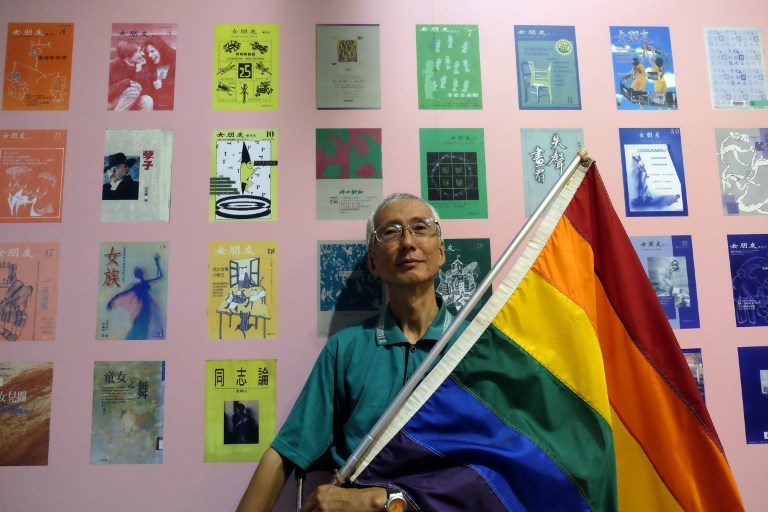SUMMARY
This is AI generated summarization, which may have errors. For context, always refer to the full article.

TAIPEI, Taiwan – A court ruling in Taiwan this week could make the island the first place in Asia to legalize same-sex marriage, in a decision that would give activists around the region new hope in their quest for equality.
A panel of grand justices will announce its verdict on Wednesday, May 24, in a landmark case that centers on whether Taiwan’s current law on the issue is unconstitutional.
Campaigners are nervous but optimistic after years of court appeals and lack of progress in parliament.
For one man, the battle has lasted decades.
“I feel 100% confident about a positive outcome,” said Chi Chia-wei, 59, one of two parties petitioning the constitutional court.
“I am optimistic but I wouldn’t be overly excited. This should have happened long ago,” said the activist who made his first submission for recognition of gay marriage in 1986.
At the center of the case is a clause in Taiwan’s Civil Code which says an agreement to marry should be made between a man and a woman.
Chi wants the court to rule on whether that contravenes elements in Taiwan’s constitution which guarantee equality and freedom of marriage.
The decision is binding, so a ruling in his favour would pave the way for same-sex unions to be legalised.
The other party bringing the case is the Taipei city government, which has been rejecting marriage applications by same-sex couples and is seeking clarification of the law.
Jennifer Lu and her partner of four years tried to marry in August of 2014.
“Everyone is really looking forward to the decision, not only in Taiwan but across Asia,” said Lu, an activist with rights group Taiwan LGBT Hotline Association, citing campaigns in Japan and South Korea.
Divided society
Taiwan is seen as one of the most progressive societies in the region when it comes to gay rights, and momentum has been gathering since President Tsai Ing-wen – who has openly supported marriage equality – came to power last May.
The legislature has also made more progress than ever, with proposals to amend the Civil Code passing the first reading in December.
But the debate has also highlighted deep divisions in society. Conservative and religious groups have argued that allowing same-sex unions would destroy family values.
“We have our structure of husband and wife, man and woman, and they want to change this,” said Sammy Yu, a spokesman for a group called Stability of Power.
“Marriage is not just about love, and feelings. It is also about the continuity of the human race,” he told the Agence France-Presse at a protest last week outside the office of the Judicial Yuan, which oversees Taiwan’s legal system.
At the protest, a mother read a speech saying same-sex couples cannot provide good homes for children while two dozen protesters held black umbrellas and banners reading: “Traditional marriage is not unconstitutional.”
Meanwhile, across the street, students at a girls’ high school waved a big rainbow flag from behind the gate.
If the court deems the law should be changed, it will likely set a deadline for parliament to amend the code, says Victoria Hsu, a lawyer representing activist Chi in his petition.
But Hsu – who also heads campaign group Taiwan Alliance to Promote Civil Partnership Rights – is worried that instead of changing the Civil Code, the judges will lean towards enacting a separate law for same-sex unions.
Although it would represent progress, it may mean gay people would not be granted the same spousal status as heterosexual couples, she says.
“As long as you don’t have spousal status, there will always be some rights that you’re deprived of, or instances where you are treated as second-class citizens,” Hsu told AFP.
While supporters desperately hope the ruling goes in their favor, some also say there is still a long road ahead for complete acceptance, due to strong resistance from the conservative camp.
“I think the gay community might have an even harder time. There will be a lot of pushback,” says law student David Chen, 27, who identifies himself as bisexual.
“They don’t understand we are just like them. There’s nothing different about us.” – Rappler.com
Add a comment
How does this make you feel?
There are no comments yet. Add your comment to start the conversation.